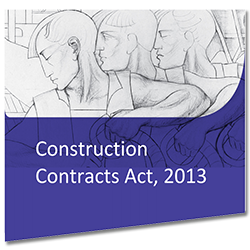Construction Contracts as defined by the Construction Contracts Act, 2013.
The Construction Contracts Act, 2013 applies to certain construction contracts entered into after the 25th July 2016 in accordance with the ‘Construction Contracts Act, 2013 (Appointed Day) Order 2016’, Statutory Instrument No. 165 of 2016. The Construction Contracts Act, 2013 encompasses applicable construction contracts whether or not the law of the State is the applicable law in relation to the construction contract or the parties to the contract purport to limit or exclude its application. Certain contracts are excluded however under the Construction Contracts Act, 2013.
The provisions concerning payments under a construction contract are set out in section 3 of the Construction Contracts Act, 2013. The Act states that a construction contract shall provide for:
- The amount of each interim payment to be made; and
- The final payment to be made; or
- An adequate mechanism for determining those amounts.
In accordance with the Act, a construction contract shall also provide for:
- The payment claim date for each amount due; or
- An adequate mechanism for determining the payment claim date for each amount due; and
- The period between the payment claim date for each such amount and the date on which the amount is due to be paid.
What Is Adjudication?
A payment dispute for the purposes of the Act is any dispute relating to payment arising under the construction contract. Adjudication as a dispute resolution methodology provides a mechanism for resolution of a payment dispute where the dispute is referred by one of the parties to an independent third party, an Adjudicator, who will make a decision on the dispute.
Section 6 of the Construction Contracts Act, 2013 provides a right for any party to a construction contract to refer a payment dispute for adjudication. The Minister of State for Employment and Small Business at the Department of Jobs, Enterprise and Innovation has published a Code of Practice governing the conduct of adjudications under section 9 of the Construction Contracts Act, 2013. The Code of Practice is binding on all Adjudicators operating under the Construction Contracts Act, 2013 in accordance with section 6(8) of the Act.
How Is An Adjudicator Appointed?
The parties to a construction contract may jointly agree to appoint an Adjudicator of their own choice. But if the parties cannot jointly agree as to whom to appoint as an Adjudicator in the period of five days referred to above, then a party to the construction contract may apply, in writing only, to the Chairperson of the Construction Contracts Adjudication Panel requesting the appointment of an Adjudicator to the payment dispute.
What is the status of an Adjudicator’s decision?
The decision of an Adjudicator is binding on the parties to the payment dispute unless the parties make a final settlement of their dispute or a different decision is reached in the event that the payment dispute is referred to arbitration or to a court of law. The decision of an Adjudicator, if binding, is enforceable either by action or, by leave of the High Court, in the same manner as a judgement or order of that Court with the same effect and, where leave is given, judgement may be entered in the terms of the decision.

